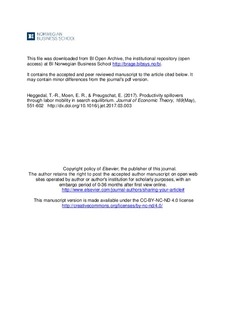Productivity spillovers through labor mobility in search equilibrium
Journal article, Peer reviewed
Permanent lenke
http://hdl.handle.net/11250/2443376Utgivelsesdato
2017Metadata
Vis full innførselSamlinger
- Scientific articles [2181]
Originalversjon
Journal of Economic Theory, 169(2017)May, 551-602 http://dx.doi.org/10.1016/j.jet.2017.03.003Sammendrag
This paper proposes an explicit model of spillovers through labor flows in a framework with search frictions. Firms can choose to innovate or to imitate by hiring a worker from a firm that has already innovated. We show that if innovating firms can commit to long-term wage contracts with their workers, productivity spillovers are fully internalized. If firms cannot commit to long-term wage contracts, there is too little innovation and too much imitation in equilibrium. Our model is tractable and allows us to analyze welfare effects of various policies in the limited commitment case. We find that subsidizing innovation and taxing imitation improves welfare. Moreover, allowing innovating firms to charge different forms of fees or rent out workers to imitating firms may also improve welfare. By contrast, non-pecuniary measures that reduce the efficiency of the search process, always reduce welfare.
Beskrivelse
The accepted and peer reviewed manuscript to the article
